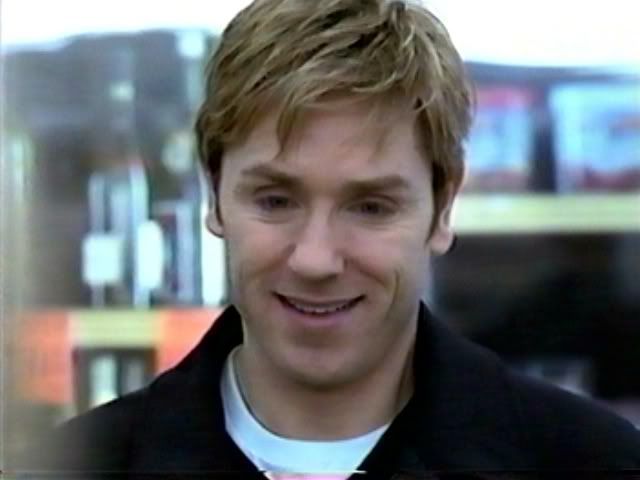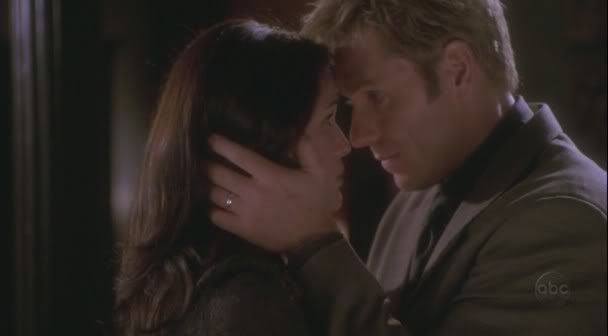|
|
Post by maggiethecat on Dec 12, 2005 18:38:01 GMT -5
Kyt wrote: And if you were in Fisk's shoes, would you automatically partner the blind cop with a ton of media-attention (and top brass) on him, with the squad's rookie?mlm's response: As for Fisk's decision to team up Karen with Jim, here's my theory as to his thought process, which I think is consistent with what we see him doing in the Pilot. Plan "A" is to try to persuade Jim to stay in the squad room. If that doesn't work, Plan "B" is to partner him with Karen and assign them to minor cases. That way, his two more experienced detectives are available to work the more serious cases and he isn't "wasting" one of them "babysitting" the blind guy. Besides, Fisk probably believed at the outset that anything he did was likely to be a short-term arrangement, because Jim would not last on the job. Hey, Kyt and mlm! I wish I'd gotten the hang of the multiple quote boxes, but you have both raised and investigated some excellent "talking" points . . . all of which only serve to reinforce my contention that we can talk about The Pilot until the end of time. And probably will.  So why was Karen partnered with Jim? (I can't believe we've haven't explored this before -- it's so chewy.) I tend to go with mlm's theory that Fisk may have thought he was putting the two least effective members of the squad together and therefore minimalizing the "damage" to his squad (or the squad's record in closing cases). Or he simply had, in Karen, a detective without a current partner (and we never do find out why this is, do we?) so the match-up was a natural. Or inevitable. We never do get a good sense -- unless, Kyt, I missed something! -- of how many detectives are in the squad: what the partnership pool is, in other words. All we see is desks in the background, and a few extras from time to time who seem to mostly walk around with a piece of paper in hand. Which is fine -- we don't want to be distracted from the major players -- but it doesn't give us much to go on. I do believe that Fisk thought, at the beginning, that Jim wouldn't last on the job. And he does hand Karen and Jim junk cases. But Kyt raised a really interesting question: why would Fisk, who from the outset seems smart and sober and no fool, partner the one tec in his squad that's under a microscope from the minute he walks in the door with the least experienced member of the squad? Can we infer that Fisk had more respect for Karen's capabilities than we are initially shown? Can we make the "leap of faith"and assume that Fish partnered Jim with Karen because he intuitively, as a "good manager," knew she was good? Because he knew that more than laconic old "don't rock the boat" Tom or short-tempered Marty, she would actually be able to work with Jim Dunbar? That if anyone could make this problematic and more than likely doomed partnership actually work it would be Karen? Could be. After all, wouldn't it look better for Fisk with One P. P. if Dunbar succeeded than washed out? Hmmm.
|
|
|
|
Post by mlm828 on Dec 12, 2005 19:58:36 GMT -5
After all, wouldn't it look better for Fisk with One P. P. if Dunbar succeeded than washed out? Maybe, maybe not. If everyone expected Jim to fail, Fisk probably would not have been worried about being criticized by the brass when that happened. And there were probably some at One P.P. who would be just as happy if Jim did fail. I doubt everyone there felt the resentment over his lawsuit was "water under the bridge," and as Fisk later tells Jim, there will always be people who don't think he should be a detective in the first place. Wouldn't we love to know what (if any) marching orders Fisk got from the higher-ups when they told him about Jim's assignment? |
|
|
|
Post by maggiethecat on Dec 12, 2005 20:10:10 GMT -5
Wouldn't we love to know what (if any) marching orders Fisk got from the higher-ups when they told him about Jim's assignment? We do have one major clue. In Jim's interview with Fisk, when Fisk tells says the Chief of Ds gave him "the impression" that Jim wanted to be out in the field. This may have been a conditional part of Jim's reinstatement: i. e. Dunbar would back on full duty and not any sort of modified assignment. Which could easily explain why Fisk *asked* him to reconsider and stay in the squad room. My guess? The brass played it "straight" once Dunbar won his lawsuit, perhaps wanting to avoid further repercussions in the press (or another lawsuit). And then they gave the problem to Fisk, to handle as best he saw fit. And Fisk, as I see it, did play it by the book -- with the notable exception of initially handing Jim and Karen cases far beneath their capabilities. |
|
|
|
Post by mlm828 on Dec 12, 2005 21:26:38 GMT -5
Wouldn't we love to know what (if any) marching orders Fisk got from the higher-ups when they told him about Jim's assignment? We do have one major clue. In Jim's interview with Fisk, when Fisk tells says the Chief of Ds gave him "the impression" that Jim wanted to be out in the field. This may have been a conditional part of Jim's reinstatement: i. e. Dunbar would back on full duty and not any sort of modified assignment. Which could easily explain why Fisk *asked* him to reconsider and stay in the squad room. My guess? The brass played it "straight" once Dunbar won his lawsuit, perhaps wanting to avoid further repercussions in the press (or another lawsuit). And then they gave the problem to Fisk, to handle as best he saw fit. And Fisk, as I see it, did play it by the book -- with the notable exception of initially handing Jim and Karen cases far beneath their capabilities. More really good points. However, I wonder why the Chief would give Fisk the "impression" Jim wanted to go out in the field if allowing him to do so was a condition of his reinstatement. Maybe it's just a turn of phrase. In addition, if being allowed to work in the field was not a condition of his reinstatement, Fisk could simply have ordered Jim to stay in the squad room. On the other hand, as has been suggested before, allowing Jim to work in the field could have been part of a strategy to give him enough rope, in the hope he would hang himself. Kyt wrote: And if you were in Fisk's shoes, would you automatically partner the blind cop with a ton of media-attention (and top brass) on him, with the squad's rookie?So why was Karen partnered with Jim? (I can't believe we've haven't explored this before -- it's so chewy.) I tend to go with mlm's theory that Fisk may have thought he was putting the two least effective members of the squad together and therefore minimalizing the "damage" to his squad (or the squad's record in closing cases). Or he simply had, in Karen, a detective without a current partner (and we never do find out why this is, do we?) so the match-up was a natural. Or inevitable. We never do get a good sense -- unless, Kyt, I missed something! -- of how many detectives are in the squad: what the partnership pool is, in other words. All we see is desks in the background, and a few extras from time to time who seem to mostly walk around with a piece of paper in hand. Which is fine -- we don't want to be distracted from the major players -- but it doesn't give us much to go on. I do believe that Fisk thought, at the beginning, that Jim wouldn't last on the job. And he does hand Karen and Jim junk cases. But Kyt raised a really interesting question: why would Fisk, who from the outset seems smart and sober and no fool, partner the one tec in his squad that's under a microscope from the minute he walks in the door with the least experienced member of the squad? Can we infer that Fisk had more respect for Karen's capabilities than we are initially shown? Can we make the "leap of faith"and assume that Fish partnered Jim with Karen because he intuitively, as a "good manager," knew she was good? Because he knew that more than laconic old "don't rock the boat" Tom or short-tempered Marty, she would actually be able to work with Jim Dunbar? That if anyone could make this problematic and more than likely doomed partnership actually work it would be Karen? Still more good points. We don't know why there was a position open in Fisk's squad or whether Karen had a partner before. I suppose it's possible she had a partner who was promoted, or retired, or decided he couldn't stand another winter in the Northeast and moved to San Diego (  -- sorry about that, but between crooked Congressmen and the Chargers losing to Miami, the weather is all we have left here!). Another thought about Karen. She seems to have become a detective and been assigned to work on major cases at a relatively young age, which may say something about her capabilities. Those more knowledgeable can correct me if I'm wrong, but I'm guessing one does not go straight from the Police Academy to being a homicide detective. So, despite Karen's relative lack of experience, Fisk may have felt she had other abilities which suited her for the difficult role of Jim's partner. Whatever his reasons, Fisk's decision turned out to be the right one. |
|
|
|
Post by maggiethecat on Dec 13, 2005 13:31:49 GMT -5
More later in the day, but quickly responding to one question re Karen:
I seem to remember (referencing Blue Blood again, natch) that it takes at least five years as an NYPD patrolman/beat cop/uniformed officer before you can apply for a detective's position. (I can't remember if there's a test, as there is for the position of Sargeant, but there may be.) And there are "grades" of detective, which is keyed to the color of the badge, Gold Shield being the top and most desirable. Dunbar is clearly a Gold Shield man -- with ten years on the job it would almost be automatic.* That's definitely a Gold Shield he pulls out of the desk drawer at the beginning of The Pilot, and flashed throughout the series. So now I have to go back and check the colors of the other detectives' shields! (Of course they all came from the prop room, and no one on the production staff may have made the distinction.)
I always figured Karen for being in her late Twenties, which fits with one year at the Police Academy (maybe after a couple of years of college?), followed by five years on patrol and maybe a year plus as a detective. And whatever her partner situation, she had been working the Tongue Collector case for a couple of months, so we can assume Fisk had respect for her capabilities.
Mags
*If Dunbar hadn't attained Gold Shield grade before the bank, the department probably would have awarded it to him for his actions (a la Frank Serpico being awarded his Gold Shield after he was shot in the face). A few weeks ago a uniformed NYPD officer was shot and killed in the line of duty and the dept. promoted him to detective posthumously, as a mark of honor and also so his widow would receive a better pension.
|
|
|
|
Post by maggiethecat on Dec 13, 2005 16:51:57 GMT -5
This has absolutely nothing to do with the discussion on the table, but I have always wondered . . . Re the ever-ditzy Miss Chenowith and her missing pooch ashes. Let's say it, all together now: "Like . . . totally blind?" 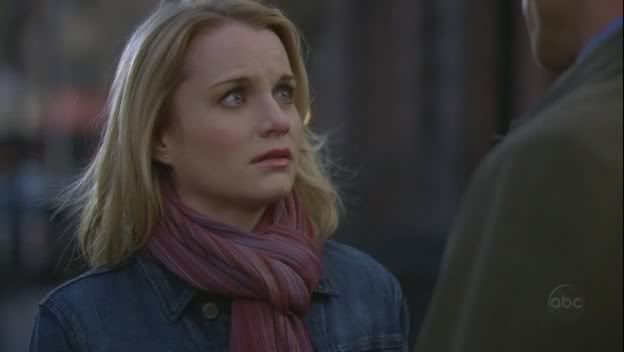 Was the naming of this memorable, albeit minor, character, a bit of an inside joke on the part of the writers? She's a dead ringer for Kristin Chenowith, star of Wicked on Broadway and now The West Wing and those annoying Old Navy commercials, and both actresses have the same distinctive Minnie Mouse voice. Always wondered . . . always giggled a little. |
|
|
|
Post by bjobsessed on Dec 13, 2005 20:56:29 GMT -5
Speaking of Ms. Chenowith, I'm watching the pilot right now and it just struck me how dumb she really is. Before she asks Jim if he's totally blind she asks Karen: "Can you see?," in that wimpy little voice. How does she think they got there?  You have to admit, she's good for a laugh. |
|
|
|
Post by mlm828 on Dec 14, 2005 1:52:01 GMT -5
Speaking of Ms. Chenowith, I'm watching the pilot right now and it just struck me how dumb she really is. Before she asks Jim if he's totally blind she asks Karen: "Can you see?," in that wimpy little voice. How does she think they got there?  You have to admit, she's good for a laugh. No doubt about it, our Ms. Chenowith is truly ditzy. Apparently, she was confused by Karen's sunglasses: 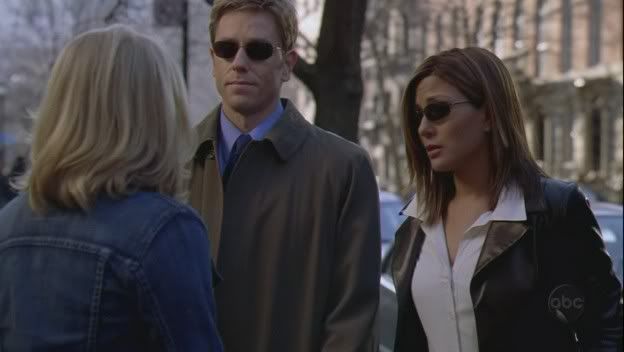 It doesn't take much to confuse her, does it? By the way, Karen must have learned from this, because we never see her wear those sunglasses again. |
|
|
|
Post by hoosier on Dec 15, 2005 17:46:25 GMT -5
I assumed, don't ask me why, that Karen had recently made detective! She is clearly ambitious and career-oriented--her "not wanting to be held back" comment to Jim, her less than stellar personal life, being assigned to the tongue collector case and her plainly pissed-off attitude at being pulled from the case to be Jim and Hank's "chauffeur". Since she was without a partner, it was only natural for Fisk to team her with Jim, that and the fact that Fisk would have been well aware of Jim's file and maybe thought that she would benefit from his experience.
I often wondered if Karen had had experience with a blind person--a family member??? She was so natural in offering to lead him and in clueing him in on visual signals he would miss--Lynn Bodner's roomie nodding for example. I could not see Marty being as considerate.
At the site of the stolen car, when Jim wanted the crime lab called because he smelled cordite on the door, she made the call. Did she believe it? I don't think so. Was she willing to give him the benefit of the doubt? Maybe. He had the reputation as a good detective. Or was she hoping that he would be proven wrong, showing he wasn't the hotshot played up in the press.
Why was Jim assigned to the 8th? His position in his old precinct would have been filled by then and I feel there was probably bad blood and hard feelings from his law suit. Also, they clearly needed a warm body at the 8th since Karen was flying solo. The chief of d's must have felt that Fisk was more than capable to handle the media frenzy this brought about though the press sure disappeared after a few days. Guess they all had their 15 minutes of fame!
|
|
|
|
Post by kytdunne on Dec 16, 2005 3:53:46 GMT -5
Assorted replies/comments/thoughts:
Assuming Bettancourt's the newest squad member seems to be the most common interpretation, but what's to say she hasn't been on the squad longer than the other two? She may have gone the straight route to homicide while Russo and Selway took detours along the way, arriving later. Mind, I tend to think she's the newest, too, but that doesn't mean I'm right.
Given Bettancourt's quickness in picking up Dunbar's thought processes and running with them, I don't think we've seen anything that indicates she's somehow more lacking than the other two in solving cases. She's certainly more adept at shifting gears. She really seems to have been a good choice because of her ability to adapt to changes and take things in stride (for the most part).
Fisk - was he getting Dunbar out of the way and assigning Bettancourt to babysit when he gave them junk assignments? Or was he getting a feel for what the blind detective was going to be all about, in situations that were presumably safer and less likely to cause problems if things didn't work out.
Cops are always working with other cops, and teams/partnerships shift regularly, sometimes just for a shift or an assignment, other times for permanent changes. So given that, I don't think it'd be a reluctance to break up the Russo/Selway team so much as it is unnecessary since Bettancourt's readily the better choice (as we learned along the way, but Fisk should have known upfront).
Bettancourt probably had a good idea she was going to be teamed up with Dunbar, but it didn't make the actual news any better. I can't imagine it wouldn't have been discussed when they found out Dunbar was reassigned there, but Fisk probably didn't cement the decision until he'd met Dunbar.
Fisk's 'impression' that Dunbar wanted to go in the field: I read that as Fisk's word-choice while taking a shot at convincing Dunbar to take a desk job. He knew it was unlikely to work, but for the sake of his squad and his own sense of responsibility, he had to try. But I think it was made clear that Dunbar returning to field work was a part of the lawsuit. He probably wouldn't have had to go that far if he'd been willing to take a desk job.
For the cordite-smelling Dunbar and Bettancourt calling it in - I don't think she believed him, but he was calling the shots at that moment, she was just acting as his backup. If he hung himself, it was on him. And if he was right, it was also his doing. She didn't seem to take a personal stance outside of skepticism.
A thought on why Dunbar was assigned to a new precinct is that his old one may well have been more likely to protect him. IOW, if the brass is waiting for him to fail, they may find Dunbar's too protected in his old precinct. So put him somewhere new, as on-his-own as he's going to get in the NYPD, and see how he does.
Kyt
|
|
|
|
Post by doobrah on Dec 16, 2005 6:29:58 GMT -5
A thought on why Dunbar was assigned to a new precinct is that his old one may well have been more likely to protect him. IOW, if the brass is waiting for him to fail, they may find Dunbar's too protected in his old precinct. So put him somewhere new, as on-his-own as he's going to get in the NYPD, and see how he does. Or..... Jim's animosity towards Terry led him to request a new squad. He'd already been actively avoiding him for a year. |
|
|
|
Post by kytdunne on Dec 16, 2005 19:37:45 GMT -5
Or..... Jim's animosity towards Terry led him to request a new squad. He'd already been actively avoiding him for a year. I thought Dunbar's avoidance was more on a level with passive avoidance, in that he didn't go out of his way to contact Terry, return calls, etc. Also, I think it'd have hurt, and likely destroyed, Dunbar's stance that he was capable of returning to duty if a condition of his return was that he not be in the same squad as his old partner. Kyt |
|
|
|
Post by mlm828 on Dec 17, 2005 18:18:15 GMT -5
A thought on why Dunbar was assigned to a new precinct is that his old one may well have been more likely to protect him. IOW, if the brass is waiting for him to fail, they may find Dunbar's too protected in his old precinct. So put him somewhere new, as on-his-own as he's going to get in the NYPD, and see how he does. I think it'd have hurt, and likely destroyed, Dunbar's stance that he was capable of returning to duty if a condition of his return was that he not be in the same squad as his old partner. I agree with Kyt on both counts. It would have been a bad strategy to ask not to be assigned to his old squad, or to the squad where Terry was then working (if it wasn't the same as the squad where they'd worked together). And I doubt the department would have wanted to make it easier on Jim by assigning him to his old squad, where he may have friends or, at least, co-workers who are more likely than most to help him. I suspect that returning to his old precinct would not be an issue unless Jim made it an issue, and he would not have done so. As an aside, we don't know for certain whether the 77th Precinct, where Terry was working in "Up on the Roof," is the precinct where he'd worked with Jim. The only past assignment we know about is the "three-four," which is mentioned in Jim's speech to Galloway. Glen Semple's statement that he'd heard "a lot of good things" about Jim could indicate that he and Terry are working in the same precinct where Jim formerly worked, or he could have heard those "good things" from Terry. So how did Jim end up at the 8th Precinct? We'll never know for sure, but it's fun to speculate. One possible theory is simply that it was a precinct with an open detective position at the time of Jim's reinstatement. Perhaps the brass felt it didn't make much difference where Jim was assigned, because he was certain to fail, so they just put him where there was an opening. I'm not necessarily advocating this theory, just throwing it out as a possibility. Any other theories, anyone? More random thoughts: it would have been very easy for the department to sabotage Jim's return to work, if they had wanted to do so. They could have found a precinct where all the detectives and the lieutenant were "Marty Russos" (or pre-shooting Jim Dunbars) -- which probably wouldn't have been too difficult. Or they could have assigned him to a precinct where there was an ongoing gang war, in hopes that he wouldn't be able to keep up with the workload. The fact that they didn't do something of the sort may indicate, as maggie has suggested, that the department decided to play it straight once Jim's reinstatement was a fait accompli. |
|
|
|
Post by maggiethecat on Dec 17, 2005 20:16:31 GMT -5
So how did Jim end up at the 8th Precinct? We'll never know for sure, but it's fun to speculate. One possible theory is simply that it was a precinct with an open detective position at the time of Jim's reassignment. Perhaps the brass felt it didn't make much difference where Jim was assigned, because he was certain to fail, so they just put him where there was an opening. I'm not necessarily advocating this theory, just throwing it out as a possibility. Any other theories, anyone? Another theory? Oh sure, why not? Why was Dunbar assigned to the Eighth Precinct? Would Jim have wanted to go back to his old precinct, with not only Terry but where everyone knew him as the Old Dunbar, the sighted Dunbar? No way! As best as I understand it, a detective can "request" a particular precinct but not necessarily get the assignment. I think Jim would have wanted any precinct but his old one. It’s not unreasonable to think that he requested (not demanded or made conditional) a new house. Where no one knew him, where no one would coddle him, protect him, or try to do his job for him. Where he could put the past behind and start over, and this is all about Dunbar making a fresh start. So, again, why the Eighth Precinct? From what we know, the Eighth is in Greenwich Village on the edge of Chinatown. Not exactly a backwater, but less pressured than say, the South Bronx, with a high murder rate, the worst narcotics activity in the City, and gang wars. So yeah, I’m thinking the NYPD wasn't about to park Dunbar in the Bronx.  It may all come down to Fisk, and his reputation within the department. The lieutenant sets the tone for the house. Fisk is a straight shooter, he’s honest and decent and fair, and he’s a good "people" manager. He's no pushover, but neither is he harsh. He also seems to have a first-rate -- although never warm and fuzzy -- working relationship with the Chief of Ds. The thinking at One Police Plaza may very well have been, “Give this problem to Fisk. If anyone can make it work, he will. And we’re all going to look a lot better -- and keep the press off our backs -- if it does work.” If we can assume the department did decide to “play it straight” once Dunbar was reinstated, that could explain his being assigned to Fisk’s squad. And if this all plays out (and I’m just doing my own jazz riff here, amusing myself with brain candy), then that could also explain, in a weird sort of way, why Fisk assigned Jim to minor cases in the beginning. Not to punish him for any lack of skills -- or even for being blind and therefore a liability to his other detectives, as he says -- but to bring Dunbar along slowly, to see what his capabilities and skills were. To try -- perhaps at the request of One PP -- to keep Dunbar under the radar for a while to see if he was going to “make this work.” But Dunbar, of course, forces Fisk’s hand by solving the Tongue Collector case. And we were off and running . . .  |
|
|
|
Post by mlm828 on Dec 17, 2005 21:21:21 GMT -5
It may all come down to Fisk, and his reputation within the department. The lieutenant sets the tone for the house. Fisk is a straight shooter, he’s honest and decent and fair, and he’s a good "people" manager. He's no pushover, but neither is he harsh. He also seems to have a first-rate -- although never warm and fuzzy -- working relationship with the Chief of Ds. The thinking at One Police Plaza may very well have been, “Give this problem to Fisk. If anyone can make it work, he will. And we’re all going to look a lot better -- and keep the press off our backs -- if it does work.” If we can assume the department did decide to “play it straight” once Dunbar was reinstated, that could explain his being assigned to Fisk’s squad. If this was the department's strategy -- to put Jim in a precinct where he would have a chance of making it work -- I don't think they did it out of the goodness of their hearts. Rather, it was to enable them to say, "We told you so; we gave him every opportunity, but he couldn't cut it," and avoid further negative publicity or litigation if (or when) he failed. One further thought: I don't think Jim is the kind of guy who would go running to his lawyer or the press if he had problems on the job -- he didn't do so in the series -- but the higher-ups in the NYPD don't necessarily know this. |
|



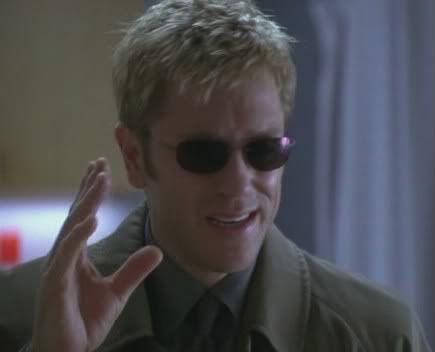

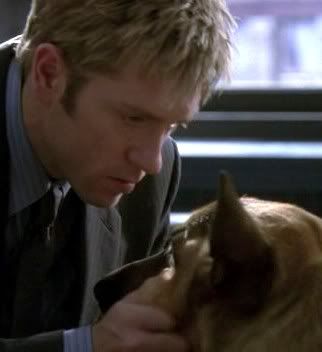
 -- sorry about that, but between crooked Congressmen and the Chargers losing to Miami, the weather is all we have left here!).
-- sorry about that, but between crooked Congressmen and the Chargers losing to Miami, the weather is all we have left here!).

